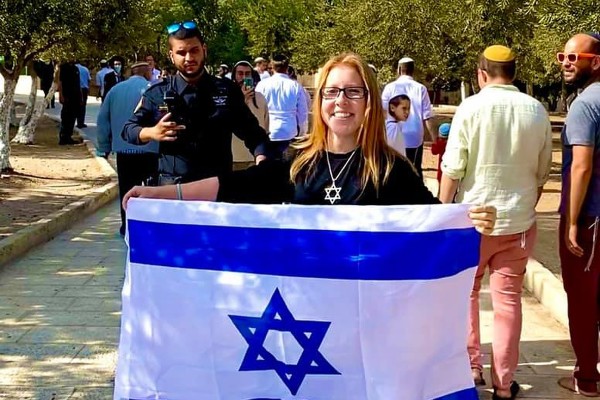Lauren Isaacs says she wasn’t trying to be provocative, but “sometimes you have to break the rules to do the right thing.”
By Pesach Benson, United With Israel
All Lauren Isaacs did was unfurl an Israeli flag on the Temple Mount on Monday. It was visible for only a few seconds when she was approached by two police officers and escorted off the esplanade.
“I held it open, smiled and didn’t say anything. It wasn’t Muslim prayer time and it was quiet on the Temple Mount,” the 25-year-old Canadian ex-pat told United With Israel.
Isaacs, a Jerusalem resident and national director of Herut Canada, ascended the Temple Mount with a group of 25-30 people, a “random assortment of Jews.”
She pulled out the flag and almost immediately, police confiscated the flag and arrested her.
Isaacs is now banned from returning to the holy site for the time being and is in touch with lawyers about the charges she may face.
“I know I’m banned indefinitely from the Temple Mount. I’m sure I’ll be served with a restraining order sometime soon,” she said. But she doesn’t know if it will be temporary or permanent.
Isaacs posted on Facebook that she had been arrested, along with a photo and video. Her post ended with the words, “Sometimes you have to break the rules to do the right thing!!! Am Yisrael Chai!!!!”
A Jewish Rosa Parks?
Asked by United With Israel what she meant, Isaacs said, “The fact that there are administrative laws that prohibit Jews from flying the Israei flag on the Temple Mount in Israel, which is the holiest site of Judaism, is disgraceful. Not all laws and rules are moral.”
“When Rosa Parks sat at the front of the bus, she was breaking the law but doing what was right,” Isaacs added. “I feel the same way about this situation. The rule preventing Jews from being proud Jews is immoral and I try to do what’s moral.”
In 2019, Isaacs caused a similar stir when she unfurled a Herut Canada flag outside the Dome of the Rock.
Monday’s incident prompted Palestinian Authority Foreign Minister Riyad al-Maliki to send letters to the Arab League and the Organization of Islamic Cooperation claiming that the “Israeli Occupation Authority” uses religious freedom to justify “invasions” at the Al Aqsa Mosque and the advance to “its expansionary colonial aspirations in occupied Jerusalem.”
Maliki also claimed, baselessly, that Israel is restricting Muslim worship on the Temple Mount.
The delicate status quo governing the Temple Mount goes back to 1967, when Israel liberated the the Old City of Jerusalem from Jordan during the Six Day War.
Fearing a religious war, then-defense minister Moshe Dayan agreed to let the Islamic Waqf, a Muslim trusteeship, continue managing the holy site’s day-to-day affairs, while Israel would maintain overall sovereignty and be responsible for security. According to the status quo, Jews and non-Muslims would be allowed to visit the Temple Mount, but not pray there.
‘Basic Jewish Human Rights Issue’
According to Jewish tradition, the Temple Mount, also known as Mt. Moriah, was the first land to appear when God separated the waters and earth on the third day of Creation. It was also the site of the Binding of Isaac and the location of the First and Second Temples. Jewish prophecy indicates that the Third and final Temple will be built there too.
While Judaism is clear that the Temple Mount is the holiest place in the world, rabbis are increasingly divided over Jews ascending to the Temple Mount. For centuries, the widespread rabbinic consensus was that the laws of ritual purity still apply to the site.
But in recent years, a growing number of rabbis have argued that ritual purity laws don’t apply to all of the Temple Mount. Some even encourage visiting permitted areas of the esplanade to maintain Jewish ties to the Mount.
“Everyone has their own opinions on that, and I respect Jews who have different different halachic [Jewish legal] opinions,” Isaacs told United With Israel. “As an Orthodox Jew, I have spoken to rabbis about the issue and I have been given permission, and I believe that it’s okay for Jews to go in certain areas.”
Isaacs added, “I will say that for people who are saying it was provocative, I absolutely unequivocally disagree. This is a basic Jewish human rights issue. I’m a proud Jew and a peaceful person. Jews should have equal rights in our homeland, and we should all be proud of our Zionisn and our Judaism.”
